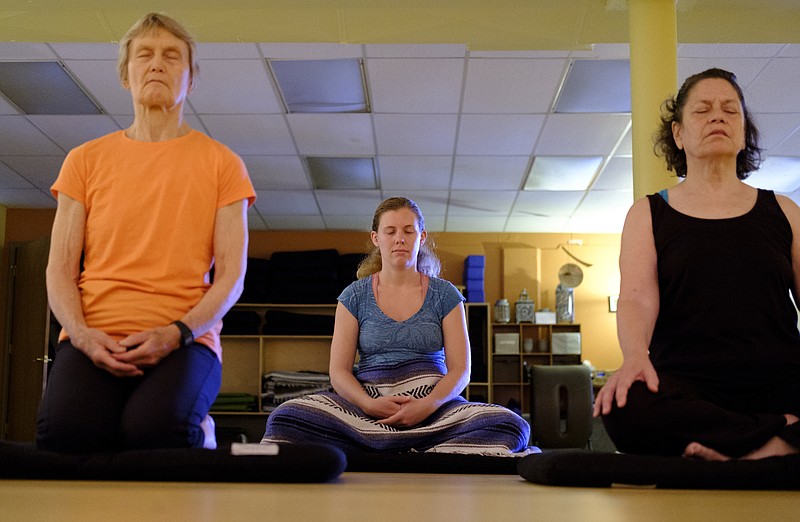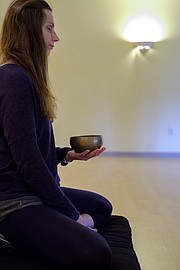More Info
For more information, visit the Chattanooga Insight at chattanoogainsight.com and Center for Mindful Living at centerformindfulliving.wildapricot.org.
Maybe, hopefully, I've become less of a jerk over the years. A little less anxious, a little more at ease. More attentive as a dad, less reactive as a husband. More open-hearted as a Christian, less judgmental as a columnist. (Maybe.)
Ask me why and I'll give several reasons.
At the top of the list is meditation.
Heard of meditation and mindfulness? LeBron does it. Oprah. The Seattle Seahawks. The late Steve Jobs. ABC's Robin Roberts. Even the kinder, gentler Howard Stern. Scientists love the way meditation re-grooves patterns of thinking, helps fight addiction, reduces stress, increases physical health.
So what is it?
Ask Kittisaro.
Born Randy Weinberg, he grew up in Chattanooga as a Baylor School legend: a decorated wrestler and Rhodes Scholar. Yet awards brought a craving that success couldn't satisfy. He sought an inner journey - he moved to Thailand, met a Buddhist teacher, became a monk for 15 years, and then moved to a hut in the woods where he lived in silence for a year.
Thousands of miles away from Chattanooga, Linda Mary Peacock grew up in working-class London. She, too, traveled to Buddhist monasteries in England and Thailand, becoming a nun for 12 years; she's now known as Thanissara.
In Thailand, she met Kittisaro.
They fell in love and left the monastery to marry.
They've since created a hermitage in South Africa, fought against the HIV/AIDs crisis there, published books and developed into some of the world's finest meditation teachers. Living in California, they also have one foot here, as founders of Chattanooga Insight Meditation at the Center for Mindful Living on Main Street.
With warmth and love for Chattanooga, Kittisaro and Thanissara recently agreed to help us understand meditation, stress and how to live with more peace.
We're calling it "Dear Monk" - an advice column for the 21st century heart and mind. Look for it once a month. The questions are yours and mine; the answers, theirs.
Dear Monk, what is meditation?
Meditation is the ancient practice of training awareness.
Meditation gathers our attention and trains our heart and mind to stay conscious and connected with actual sensations, feelings and mental states arising in this present moment.
Without training, we can think thoughts that sabotage our well-being and lead to chronic restlessness, confusion, agitation, anxiety, compulsive desire, nagging aversion and paralyzing doubts.
When the heart and mind are well trained and composed, there is more possibility of accessing clarity, energy, happiness and a compassionate connection to all that is around us.
How so?
Difficult feelings and circumstances will still arise, but we are mindful and less likely to be overwhelmed by them.
In the practice of mindfulness meditation, we are honoring the way things actually are.
But what if I don't like the way things are? What if I want life to be different?
All the wise ones over the ages have realized that countless blessings are right here within this very body and mind, but we continually overlook them when we compulsively try to get on to the next thing or imagine that we've got to get rid of something in order to be happy.
It's not that we don't change anything. As we get more skilled in our practice, it has a calming, grounding, and stabilizing effect on our body and mind because we are resting in the truth of a situation. From there, we can respond effectively.
How do I meditate?
We begin with the body.
We feel our feet touching the ground and the weight of our body pressing on the chair. Savor the moment, relax. We can let our attention sweep through the whole body, attentive to all the sensations there.
We notice our breathing. Each breath brings into the body life-giving vitality. When you breathe in, appreciate that flush of wonderful vitality permeating the whole body, blessing every cell. What we breathe out the trees breathe in, and what the trees breathe out we breathe in.
Mindfulness of breathing is a wonderful practice for pausing and letting go of obsessive thought. Notice the sensation of the breath entering and leaving the body. Relax with each out-breath. When your mind wanders, notice it, then return your attention to your breath.
We can also be mindful of sounds. Allow yourself to notice sounds around you. Notice if they are pleasant or unpleasant.
We can practice being peaceful and at ease, reflecting, 'This is how it is right now.' Sitting, hearing, listening to the sounds of the world as they come and go.
David Cook writes a Sunday column. Send him "Dear Monk" questions at dcook@timesfreepress.com or 423-757-6329. Follow him on Facebook at DavidCookTFP.

